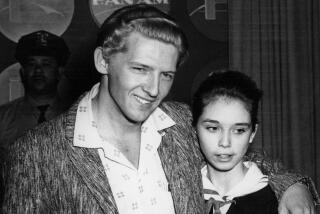FIXATIONS : The Sounds of Stylus : For Fountain Valley man who collects old phonographs, a needle in the groove brings history to life.
Some folks don’t like making the transition from records to CDs, and Neil Maken can sympathize. He has little use for these newfangled digital microprocessors and lasers, and while you’re at it, get out of here with those speakers, tubes and motors too. If it doesn’t have a hand crank and a huge horn, Maken can’t be bothered with it.
Sometimes you can get some idea of the depth of a person’s passions by scouting their periphery. In front of Maken’s house, for example, there’s a van with a license plate reading “Phono Dr” while his back yard is littered with rusted old phonograph horns and 78 r.p.m. records.
The house in between, sure enough, seems not so much a home as a phonograph museum with a kitchen. From the earliest Edison cylinder players to hulking oak consoles, his house is crowded with the history of pre-electric recorded sound.
“The incredible thing to me,” Maken said, pointing to his living room filled with venerable Victrolas and Edison Operas, “is that these are history, but when you put the needle in the groove, the years disappear. You can enjoy them the same way people did in the last century. You’re hearing the actual voices, say, of people that were living in 1890. And to listen to the actual speeches of President McKinley, or the farewell address of King Edward, makes history come to life.”
When Maken, 49, does apply the stylus to a couple of old cylinder recordings and 78s, it isn’t a former President but Sousa marches and the “Barney Google” fox trot that emerge from the phonograph horns, but they make his point.
There’s a strange immediacy to hearing sound reproduced this way, where instead of incomprehensible electronic circuitry the sole amplification is a needle attached to a diaphragm and a bell-like horn. Unlike the scratchy, tinny sound one associates with old recordings, his well-maintained machines and records sound surprisingly clear, and strident enough to make one wish for a volume knob.
Though Maken’s hobby spilled over into being his vocation some years ago--he believes he’s the only person in the world who makes his living exclusively by selling and repairing old phonographs and related items--his passion for collecting is still going at 78 r.p.m. Along with those in the house, he has an additional 30 machines in his personal collection that are in storage because he has no room to display them.
Like many hobbies, his has rolled over into other ones: Collecting Thomas Edison’s phonographs led to collecting everything on the prolific inventor, from original carbon filament light bulbs to crumbly 1870s Scientific American magazines to a scary 1900 arc-lit, hand-cranked movie projector.
Edison invented the talking doll in 1890, decidedly uncuddly things with German china heads and metal bodies housing a small phonograph. From collecting those, Maken started buying other talking dolls, even ‘60s Chatty Cathys.
Though he has hundreds of old 78s and cylinder recordings of all types of music--and even pre- Henry Fonda exercise discs--Maken particularly likes records with some historical import. Some are of presidential speeches. Others document darker sides of history, such as his 78s of “The Best of Klan Music” on the KKK label, replete with burning crosses on their red labels. “I’m not especially proud of those,” Maken noted.
And of course he has reproductions of the “His Master’s Voice” dog, Nipper, in all shapes and sizes. Despite being a little pug, Maken’s own dog, Cleo, does a fine Nipper imitation, cocking her head in that way dogs do, which to us denotes rapt attention while what they’re probably really thinking is “Huh?”
It was slightly more than a decade ago that Maken, out of curiosity, picked up his first Victrola in a San Diego thrift shop. “It was in horrible, horrible condition, so I started playing with it, fixing and restoring it, and I was hooked,” he said.
The progression from hobby to vocation was “an insidious one. Friends would ask me to help them with theirs, then their friends began calling me, so I started charging a little bit. Then I started getting letters from out of the area: ‘You fixed my friend Charlie’s phonograph, and I have a broken. . . .’ All of a sudden it started networking. Now I’m getting orders every day from Italy, New Zealand and everywhere.”
Maken even fielded an order from the Vatican, for an old 10-inch papal recording. He sold it to Vatican archivists at his cost, and when their check arrived $8 short, it took him three years to get them to send the balance. “So I got even. I never cashed their second check, and it’s probably still fouling up their bookkeeping.”
Using the company name Yesterday Once Again, Maken puts out a quarterly catalogue full of replacement parts and reprinted manuals for old phonographs, along with Nipperie (the term used for Nipper collectibles), needles and even actual bricks from Edison’s kilns. He has a standing stock of about 50 machines for sale, which range in price from $400 to several thousand dollars, and about 80 more machines awaiting restoration.
In his upstairs office is a placard reading: “The advantage of owning your own business is you only work half-days, and it doesn’t matter which 12 hours.” Lately, Maken figures he works 15-hour days seven days a week. That’s when he’s not making one of his cross-country jaunts in a truck looking for old phonographs.
“On those trips I just go ,” he said. “I don’t do any sightseeing, and I only grab a few hours sleep here and there at truck stops.”
Maken’s hero, Edison, subsisted on catnaps and was known to curl up on his lab tables, using a book for a pillow. Such habits helped Edison leave 1,093 patents to his name, which leaves Maken with a lot of collecting to do. One item that has thus far eluded him is the original Edison phonograph, which indented sound waves onto a rolled sheet of tinfoil. The inventor also made the first electric chair for Sing Sing prison, but Maken doesn’t think he has much chance of turning that up. It would clash with the other furnishings anyway.
When asked what will become of his museum-grade collection when he passes on, Maken dismissively answered: “I don’t have time to pass on. I’ve got too many things to do and things to collect.”
Making his passion into a 5 a.m. to 9:30 p.m. business, he said, “is the best of both worlds. I still enjoy the recreational side of collecting, and I get to make my living doing something I love.”
More to Read
The biggest entertainment stories
Get our big stories about Hollywood, film, television, music, arts, culture and more right in your inbox as soon as they publish.
You may occasionally receive promotional content from the Los Angeles Times.






